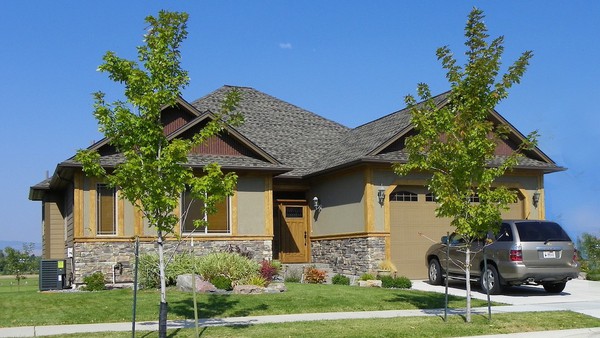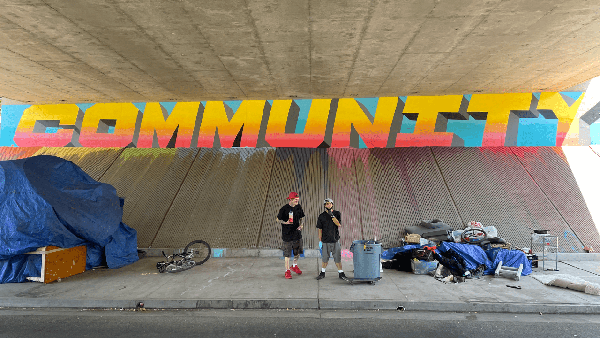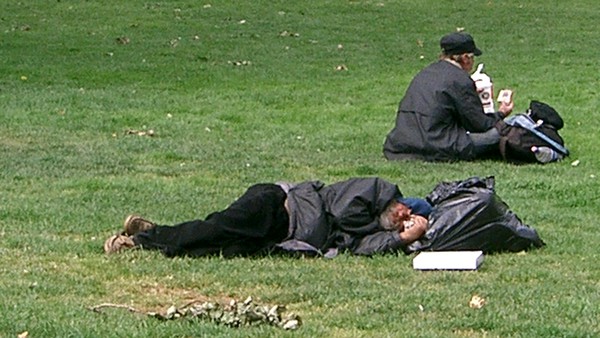The sidewalk under this Capital City Freeway overpass in Midtown Sacramento often serves as a sad and squalid home for a dozen or more tent-dwellers. During the weeks that these two gentlemen lived there, they kept it relatively tidy.
It has been five years since I moved from the Santa Cruz Mountains to Midtown Sacramento—this is my first time living in a city. As you may have heard, this place is in the midst of a kind of Renaissance, and it is a great place to live. Except for one thing: I don’t go a day without having to experience at least a twinge of trauma caused by the fact that there are hundreds of people in this neighborhood who are forced to live on the street.
I live four blocks from McKinley Park, a cultural resource that features a big rose garden, an awesome public swimming pool, outdoor yoga twice a week, and my granddaughter’s favorite playground. Walking there involves traversing one or another freeway overpass, under which I have witnessed way too much human suffering. I can’t seem to get used to this—it always provokes a mix of emotions ranging from heartbreak to anger; I don’t get mad at these folks I consider victims, but at the social and political forces that keep them where they are.
Here is a statement that should not be controversial: The primary cause of homelessness in California is a lack of housing supply and the accompanying increase in housing costs. It took California a few decades to fully recognize this, but thank goodness, the California legislature and the Newsom administration seem to have finally figured it out. Just a month ago, the state committed $200 million to move 7,300 people out of encampments and into housing.
Let More People Live in the Suburbs
I have a number of friends who, no matter how much they enjoy visiting my neighborhood, wouldn’t dream of living here because of what they view as a deplorable and dangerous situation. In theory, they might prefer city living over life in the suburbs, but not with things as they are now.
Frankly, this basic human desire for order and safety is what gave us the suburbs in the first place. Ironically, as Jon Vankin’s article about the movement to abolish zoning laws shows, there is a vicious-cycle relationship between the laws that protect American suburbs and the housing crisis that is the main cause of the homelessness crisis.
Should Zoning Laws Be Abolished?

Zoning laws that restrict new housing development cause environmental damage, racial and class segregation, and force people into cars creating traffic. Now, a new movement wants to abolish zoning in the United States.
Get to Know a Group
Big Brother Big Sisters provides children facing adversity with strong, enduring, professionally supported mentorship. The organization believes that all children can achieve success when given the proper tools and resources—and volunteer mentors are among the most important of those resources.
→ Learn more
• Diversify or Die: San Francisco’s Downtown
San Francisco has become the prime example of what downtowns shouldn’t look like: vacant, crime-ridden and in various stages of decay. But in truth, it’s just one of many cities across the U.S. whose downtowns are reckoning with a post-pandemic wake-up call.
(07/18/2023) → The Sacramento Observer


 The sidewalk under this Capital City Freeway overpass in Midtown Sacramento often serves as a sad and squalid home for a dozen or more tent-dwellers. During the weeks that these two gentlemen lived there, they kept it relatively tidy.
The sidewalk under this Capital City Freeway overpass in Midtown Sacramento often serves as a sad and squalid home for a dozen or more tent-dwellers. During the weeks that these two gentlemen lived there, they kept it relatively tidy.









